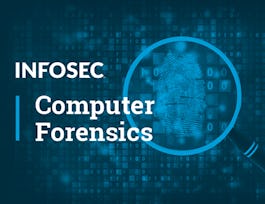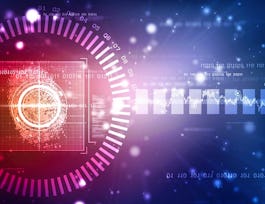In the Digital Forensics Concepts course, you will learn about legal considerations applicable to computer forensics and how to identify, collect and preserve digital evidence. This course dives into the scientific principles relating to digital forensics and gives you a close look at on-scene triaging, keyword lists, grep, file hashing, report writing and the profession of digital forensic examination.


Digital Forensics Concepts
This course is part of Computer Forensics Specialization
Taught in English
Some content may not be translated

Instructor: Denise Duffy
10,677 already enrolled
Included with 
Course
(175 reviews)
What you'll learn
The student will learn how to identify, collect and preserve digital evidence.
The student will be able to understand scientific principles relating to digital forensics.
The student will be able to understand concepts like keyword lists, grep, file hashing, and report writing.
Details to know

Add to your LinkedIn profile
1 quiz
Course
(175 reviews)
See how employees at top companies are mastering in-demand skills

Build your subject-matter expertise
- Learn new concepts from industry experts
- Gain a foundational understanding of a subject or tool
- Develop job-relevant skills with hands-on projects
- Earn a shareable career certificate


Earn a career certificate
Add this credential to your LinkedIn profile, resume, or CV
Share it on social media and in your performance review

There are 11 modules in this course
This introductory course provides a broad overview of computer forensics as an occupation by exploring methodologies used surrounding digital forensics. In addition, the student acquires open-source forensic tools to use throughout this path.
What's included
4 videos3 readings
In this module, you'll explore the laws that apply to digital forensics. Multiple state and federal laws apply to the field of digital forensics, as well as ethical concerns. This module demonstrates information commonly needed in a search warrant and a preservation request. The scope of search authority is covered, as well as the limitations of a consent search and guidelines surrounding wiretaps.
What's included
3 videos
An introduction to the scientific principles of digital forensics. This module covers scientific principles that apply to digital forensics. The student learns about transfer of evidence, the difference between a witness and an expert witness and "big data" concerns and solutions.
What's included
2 videos
Prepare for the practical side of forensic examinations with this module on physical evidence handling. In addition to forensic examinations, most digital investigators must understand how to manage physical evidence before, during and after leaving the scene. This module explores what to bring to a scene and how to prepare and label digital evidence for documentation purposes. You'll also examine how to collect and preserve the evidence for transportation and secure storage.
What's included
5 videos
Explore the details of digital device triage. Triaging a digital device is essential knowledge. Proper on-scene triage prevents the loss of volatile data and the collection of unnecessary devices. This module discusses capturing RAM, recognizing and dealing with encryption and destructive processes and triaging devices with a forensic boot media.
What's included
3 videos
A look at hash values and hash algorithms. In this module, the student learns how to use hash values as a way to include or exclude files from an investigation. This includes a discussion of different types of hash algorithms and how to hash individual files versus hashing drives.
What's included
3 videos
In this module, you'll explore the importance of creating a disk image. Forensic examiners need to be meticulous in their work to avoid cross-contamination when creating a bit-stream copy. This module explains the importance of sterilizing media, how to validate tools, proper application of the write-blocker and validating the forensic bit-stream copy.
What's included
5 videos
Explore the details of keyword and grep searches. How to conduct a keyword search using automated tools and how to establish a keyword list is covered in this module. The student receives an overview of grep, as well as completing a grep search using an automated tool.
What's included
4 videos
A look at network basics for the computer forensics investigator. This module describes what a network is, how it functions, what IP addresses are and an IP address’s function on the network. This module also explores what a MAC address is and why it is vital to network forensics. Internet protocols are also covered.
What's included
4 videos
A look at the importance of reporting and peer review. Report writing and peer review are of utmost importance. In this module, the student examiner learns what information to include and what does not belong in a final report. The student views several example reports, as well as generates a report using forensic software.
What's included
3 videos1 quiz
What's included
2 videos2 readings
Instructor

Offered by
Recommended if you're interested in Security

Infosec

Infosec

Infosec

EC-Council
Why people choose Coursera for their career




Learner reviews
Showing 3 of 175
175 reviews
- 5 stars
82.95%
- 4 stars
14.20%
- 3 stars
1.70%
- 2 stars
1.13%
- 1 star
0%
New to Security? Start here.

Open new doors with Coursera Plus
Unlimited access to 7,000+ world-class courses, hands-on projects, and job-ready certificate programs - all included in your subscription
Advance your career with an online degree
Earn a degree from world-class universities - 100% online
Join over 3,400 global companies that choose Coursera for Business
Upskill your employees to excel in the digital economy
Frequently asked questions
Access to lectures and assignments depends on your type of enrollment. If you take a course in audit mode, you will be able to see most course materials for free. To access graded assignments and to earn a Certificate, you will need to purchase the Certificate experience, during or after your audit. If you don't see the audit option:
The course may not offer an audit option. You can try a Free Trial instead, or apply for Financial Aid.
The course may offer 'Full Course, No Certificate' instead. This option lets you see all course materials, submit required assessments, and get a final grade. This also means that you will not be able to purchase a Certificate experience.
When you enroll in the course, you get access to all of the courses in the Specialization, and you earn a certificate when you complete the work. Your electronic Certificate will be added to your Accomplishments page - from there, you can print your Certificate or add it to your LinkedIn profile. If you only want to read and view the course content, you can audit the course for free.
If you subscribed, you get a 7-day free trial during which you can cancel at no penalty. After that, we don’t give refunds, but you can cancel your subscription at any time. See our full refund policy.

